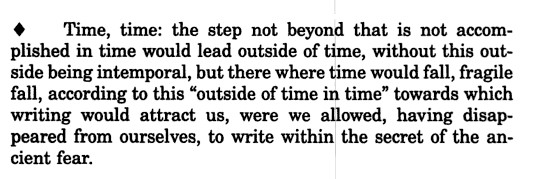Translation as step outside time

That’s Maurice Blanchot, from the start of his Le pas au-delà, translated by Lycette Nelson as The Step Not Beyond twenty years after its French appearance, in a strange bit of torquery that at times infects English, for the title would be more literally translated as The Step Beyond/The Not-Beyond. At first sight. Lycette Nelson, in her introduction, was well aware of the problem of the sound wave and its oscillation. For, with “pas” being “step” and negation, the second particle of negation placed “au-delà”, on the far side of, the verb (the first particle, the “ne”, is found in French on the near side of the verb, rubbing up against the subject), I understand her desire to insert a “Not” in the title beside “Step”. But the dual meanings, in Blanchot, work in self-obliterating oscillation, and do not cohabit shared space-time. The Step into the dark, the no-life-after-death. Deepstep Come Shining, as CD Wright might have titled it.
Except, in all these cases we lose the sonority of Blanchot’s title, its playful sound, which could be rendered perhaps as The Pim Pam Man. In French, the sonority and repetition, the clipped syllables, however unrelated they are to meaning, inevitably infect the meaning, and point us to the absurdity of the title, to its instability. Out of Step Way Out.
In Spanish, Cristina de Peretti translated the title as El Paso (no) más allá. Following her example, could we say The Step (Not) Beyond? But this destabilizes too far; the grasp the reader in French has on the words and alternation of meanings is now far too lost in graphisms.
What’s important is that in reading Le pas au-delà, a book on dying as transgression of time, I can read it also as a book on translation as transgression of time (Elisa Sampedrín articulates it very well in the course of the mystery novel or book of poetry O Resplandor, for translation is a step out of time, lets time go backward). The Misstep Beyond. The Misty Misstep. The Steppe Beyond. Step There. Stop where? Translation, yes, always makes a present of a past, it is a present text in the presence of a text that has already ceased being written. It is the thinking beyond death that Blanchot says is impossible. Translation, perhaps, is its only possibility.
The Spanish “Más Allá” reminds me too of “Máis Alá”, its equivalent in Galician, the title of the great avant-garde manifesto of Galician poet Manoel Antonio (1922), a title translated by Kirsty Hooper as Further Still.
The Step (Not) Further, the One More (or less) False Step. The Step Further Still. Step into the Brink. Deepstep. The Day I Twisted My Ankle.
Blanchot himself: « Temps, temps : le pas au-delà qui ne s'accomplit pas dans le temps conduirait hors du temps, sans que ce dehors fût intemporel, mais là où le temps tomberait, chute fragile, selon ce “hors temps dans le temps” vers lequel écrire nous attirerait, s'il nous était permis, disparus de nous, d'écrire sous le secret de la peur ancienne. »
My translation of the little snippet of Blanchot: “Time, time: the not-afterlife and its step further yet that can’t be carried out inside time may lead outside time, without this outside being timeless. Rather, it is that place where time might tumble, stumble fragile, in keeping with the “outside-time in time” towards which writing would pull us, if we were allowed (vanished from “us”) to write beneath the seal of ancient fear.”
In other words, if we are allowed to translate. To Step Outside, Shining. The Outside Time that is not timeless. Swimming upstream against that current again (olfaction, remember), toward the scent of our own mysterious origin/oscillation in language-time.
T r a n s l a t i o n ' s__H o m e o p a t h i c__G e s t u r e s